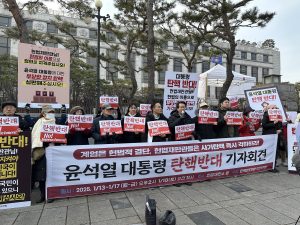On December 3, 2024, South Korea’s President Yoon Suk-yeol declared martial law in a late night address. The move shocked the country and the world, setting in motion a political crisis that continues today. With the testimony of military officials revealing a broader plot to arrest opposition political figures, Yoon was impeached by the National Assembly. While the Constitutional Court case to consider his impeachment proceeds, the Corruption Investigation Office for High-ranking Officials (CIO) is investigating Yoon on charges of insurrection – along with treason, the only crime that a sitting president can be charged with. After using the Presidential Security Service to repulse one arrest attempt, Yoon was arrested on January 15. Yoon’s detention – and a later court ruling extending it – sparked angry protests from his supporters, some of whom attacked and vandalized the court building.
How did South Korea get here?
The Diplomat’s editor-in-chief, Shannon Tiezzi, interviewed Gi-Wook Shin, the William J. Perry Professor of Contemporary Korea in Sociology at Stanford University. The national reaction to Yoon’s martial law declaration “underscores how South Koreans’ hard-won democracy is not taken for granted,” Shin, an expert on social movements and democracy in South Korea, says.
“…This episode highlights both the fragility and resilience of Korea’s young democracy.”
How did South Korea’s history as a dictatorship – and past experiences of martial law – inform both Yoon’s decision to declare martial law and the public response?
South Korea’s painful history with dictatorship and martial law casts a long shadow over contemporary politics. I entered college in 1979, a year marked by the assassination of Park Chung-hee in late October and a period of intense political instability ensued under martial law. In fact, President Yoon Suk-yeol entered a college in the same year as me, and it is hard to understand how he could forget these shared experiences and decided to declare martial law.
When Yoon declared martial law last December, it triggered an immediate and decisive public backlash, driven by a collective memory of decades of struggle against autocratic regimes. This reaction underscores how South Koreans’ hard-won democracy is not taken for granted. Civic groups, citizens, and lawmakers mobilized swiftly, reversing the martial law decision within six hours and passing the motion to impeach Yoon 11 days later. Despite recent backsliding, proactive civic engagement demonstrates that their experiences have informed strong commitment to safeguarding democratic principles.

































